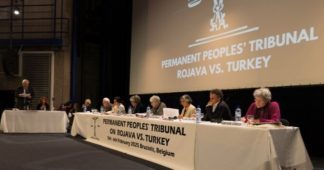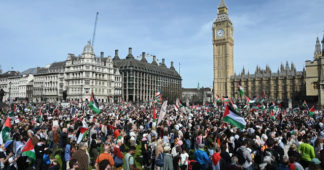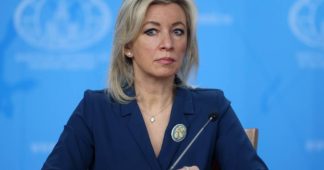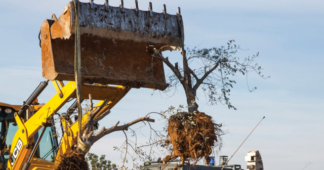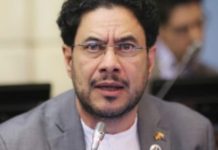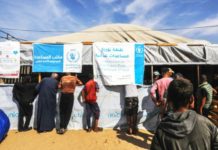In the face of genocide and global inaction, the Tribunal recognizes that the challenge of justice falls to people, to legitimate resistance, to acts of solidarity, to civil society, to social movements, and to people of conscience everywhere.
A people’s tribunal
Almost sixty years ago, the world watched in horror as the US carried out brutal aggression and serial atrocities against the people of Vietnam. Those atrocities, and the apparent impunity afforded to the US in their commission, was, for many, too much to bear.
Because no state, no group of states, or international institution was coming to rescue the Vietnamese people, it quickly became clear that freedom would come only from popular resistance inside Vietnam, and a global solidarity movement outside.
It was in that context that Bertrand Russell, the prominent British philosopher and public intellectual, launched the first “people’s tribunal” as an organized expression of moral outrage.
In 1967, he stood before the Russell Tribunal and declared: “We are not judges. We are witnesses. Our task is to make mankind bear witness to these terrible crimes and to unite humanity on the side of justice.”
Today, another people’s tribunal is following in the footsteps of Russell, this time to confront the Israeli regime’s genocide in Palestine, the racist ideology that underpins it, and the complicit western powers and corporations that enable it.
The Gaza Tribunal
Assembled in November of 2024, and meeting for the first time in London in February of 2025, the Gaza Tribunal has just completed its first public meeting in Sarajevo (26-29 May 2025) with the adoption of the Declaration of Sarajevo.
The Tribunal was initiated by another celebrated public intellectual, this time Professor Richard Falk, preeminent professor of international law, former UN Special Rapporteur on human rights in Palestine, and now the President of the Gaza Tribunal.
The Gaza Tribunal assembles thinkers and activists from Palestine and around the globe to address not only the colonial and genocidal horrors being perpetrated by the Israeli regime in Palestine, but also, the complicity of powerful states, corporations, media companies, and Israel proxy groups in the West, as well as the inaction or inadequate response of the majority of countries and institutions in the world, whether at the national or international levels.
Structuring itself around three “chambers,” the Tribunal considers questions of (1) international law, (2) international relations and world order, and (3) history, ethics, and philosophy, examining all aspects of the struggle against genocide and for Palestinian freedom.
Considering survivor testimonies, expert witnesses, and the analysis of its members, the Tribunal will ultimately convene a “jury of conscience” to pronounce later this year. It is compiling an archive of evidence. And its Declaration of Sarajevo, adopted on 29 May 2025, encapsulates its vision for a global, moral response to the ongoing Nakba in Palestine.
Why a tribunal?
The work of the Tribunal is based on a fundamental premise: that the people of Palestine are human beings with human rights, including the right to self-determination, to return to their homes anywhere in historic Palestine, to equality under the law, and to freedom from fear and want. It recognizes that the alignment of dark forces perpetrating genocide in Palestine represents an existential threat to the survival of the people of Palestine, to international peace and security, and to the project of a just international order. And it begins with the recognition that governments and the international institutions ostensibly established to maintain peace and security and to advance human rights and international law have failed to end the impunity of the Israeli regime and to respond effectively to the genocide and to a century of colonial persecution in Palestine.
As such, the Tribunal recognizes that the challenge of justice falls to people, to legitimate resistance, to acts of solidarity, to civil society, to social movements, and to people of conscience everywhere. It understands the need to mobilize the power of the people, in their millions, to challenge the crimes of the Israeli regime and its co-conspirators, to isolate the Israeli regime and to actively dissent to the complicity of our own governments and institutions.
It seeks to counter the forces of evil with the forces of justice, by bringing pressure to bear in every sector, and making clear that genocide will not be normalized, that apartheid will not be normalized, that colonialism will not be normalized, and that Palestine will be free. This is the cry of conscience of the Gaza Tribunal. A call to all decent people to oppose the lawlessness and brutality of powerful actors implicated in the genocide in Palestine, foremost the Israeli regime, but also the US, the UK, Germany and their collaborators.
What the Tribunal is not
While the Tribunal includes some of the most skilled international lawyers on the planet, it is not a formal judicial or legal mechanism, but rather an assembly of civil society, of movements, of thinkers and activists, and of people of conscience determined to end the horrors that we are all forced to witness in Palestine.
Neither does the Tribunal believe it must wait to act until final pronouncements are made by any international court, years down the road. In the face of a historic exigency like genocide, members of the Tribunal view passive deference to official institutions as morally indefensible.
Unlike a court, the Tribunal begins with the recognition of the reality of genocide, of apartheid and settler colonialism, which its members see as undeniable realties. These crimes have long been confirmed by prominent human rights organizations, UN bodies, and genocide scholars, and are by now beyond reasonable doubt. Indeed, this assault in Gaza has rightly been called “the world’s first livestreamed genocide.”
While official institutions endlessly debate whether the night is falling, the people of Palestine know that the darkness is already here, and that means that we all have a moral obligation to find ways to restore the light. The Tribunal therefore sees an urgent moral imperative in confronting these crimes now, with all the power and resolve that can be mobilized in society.
The Tribunal also differs from many official institutions in that it does not engage in the moral prevarication that is so common among governments and official institutions, including the political offices of the UN. The Tribunal rejects the rhetorical application of a “both sides” approach to a situation like Palestine, in which the two sides are colonizer and colonized, occupier and occupied, oppressor and oppressed, genocidaires and victims.
Neither does the Tribunal recognize an Israel exception to international law, so often insisted upon by Western powers to buttress Israeli state impunity and to protect individual Israeli perpetrators from accountability. But either the law is real and applies to all equally, or it is a lie, a perfidious weapon of oppression and subjugation in the hands of power. The Tribunal comes down squarely on the side of the rule of law.
Finally, the Tribunal refuses the gag orders imposed by the Israeli regime, its Western allies and proxies, and its complicit media corporations. The Tribunal speaks openly about root causes, the words that states and official institutions often refuse to utter, including Zionism, settler colonialism, ethno-supremacism, and apartheid, because they are the root of the problem. And the Tribunal confronts genocide directly, never diverting its eyes, never employing the familiar rhetorical tricks (“only a court can declare genocide”) often used by UN officials to avoid the question.
The Tribunal does so not only because it’s right in moral terms, but also in recognition of the simple truism that no conflict can be resolved without attention to root causes. And it should by now be clear to all that the Palestine crisis will certainly not be resolved by reviving the stinking corpse of the Oslo process, by establishing Palestinian Bantustans, or by an amorphous promise of a two-state solution somewhere down the road.
As evidenced by its Declaration of Sarajevo, the Tribunal speaks the truth outload, and has the audacity to demand actual justice, not empty rhetoric or meaningless consolation prizes in its stead.
A Declaration of conscience and a call to action
Thus, the Sarajevo Declaration offers itself as an antidote to the moral obfuscation, the distorted narratives, and the silent complicity that has dominated official positions for the past nineteen months, indeed, the past seventy-seven years. The declaration is an appeal of conscience that directly addresses the struggle against the darkness, the evil of the Israeli regime, its ideology and actions, and its collaborators. And it provides a platform for collective action upon which people can organize.
Thus, in the Declaration of Sarajevo, the Gaza Tribunal declares moral outrage at the genocide and the myriad other crimes of the Israeli regime, solidarity with the people of Palestine, and commitment to working with partners across global civil society to end the genocide, and to ensure accountability for perpetrators and enablers, redress for victims and survivors, and a free Palestine.
It demands an immediate end to those crimes, including the occupation, the siege, the apartheid, and the genocide, and freedom for all Palestinian prisoners. It calls on all governments and on international organizations to act. And it denounces all those who have been complicit in the regime’s crimes, from states to media companies, arms corporations, and others.
Importantly, the Declaration expresses the conviction that the struggle against all forms of racism, bigotry, and discrimination necessarily includes the equal rejection of Islamophobia, anti-Arab and anti-Palestinian racism, and antisemitism, as well as an acknowledgment of the horrific effects of Zionism, apartheid, and settler-colonialism on the Palestinian people. The Declaration explicitly rejects “the destructive ideology of Zionism, as the official state ideology of the Israeli regime, of the forces that colonized Palestine and established the Israeli state on its ruins, and of pro-Israel organizations and proxies today.” And it calls for decolonization across the land, an end to the ethno-supremacist order, and the replacement of Zionism with a dispensation founded on equal human rights for Christians, Muslims, Jews, and others.
Expressing concern both at the failings of the international system and at attacks on those international institutions that have challenged genocide and apartheid in Palestine, the Declaration demands immediate action to isolate, contain, and hold accountable the Israeli regime. To these ends, it calls for universal boycott, divestment, sanctions, a military embargo, suspension from International organizations, and the criminal prosecution of perpetrators of war crimes, crimes against humanity, genocide, gross violations of human rights, and complicity.
It denounces the wave of persecution and crackdowns on human rights defenders, peace activists, students, academics, workers, and professionals, and honors those who, despite this persecution, have had the courage and moral convictions to stand up and speak out. And it calls out the tactic of smearing as “antisemites” or “supporters of terrorism” all those who dare to speak up against the Israeli regime and its crimes.
The Declaration honors “the courageous resistance and resilience of the Palestinian people, and the movement of millions standing in solidarity with them,” and it recognizes the right of the Palestinian people to armed resistance in accordance with international law. It recalls that the Palestinian right to self-determination is “jus cogens and erga omnes and is non-negotiable and axiomatic.” And it respects “Palestinian aspirations and recognizes full Palestinian agency and leadership over all decisions affecting their lives.”
While critical of the failure of most international institutions to act effectively to challenge the Israeli regime and its crimes, the Declaration also recognizes those international actors that have acted with principle. It praises the International Court of Justice for its historic genocide case against the Israeli regime and for its landmark advisory opinions on Palestine. It recognizes South Africa for bringing the genocide case to the ICJ. And it calls for expediting the case of the International Criminal Court against Israeli perpetrators, for states parties to meet their obligations to arrest them, and for the US to cease its persecution of the court.
The independent special procedures of the UN Human Rights Council are also the subject of praise, and the Declaration recognizes them “for their expert contributions and for their strong and principled voices in holding the Israeli regime to account and defending the human rights of the Palestinian people.” And the Declaration declares particular support for humanitarian actors and international agencies that have acted to defend the rights of the Palestinian people, foremost among them, UNRWA.
We will not relent: The final words of the Declaration
The Declaration of Sarajevo ends with a warning that “the world is approaching a dangerous precipice, the front edge of which is in Palestine.” It finds that key international organizations and most countries of the world have failed in defending the human rights of the Palestinian people and in responding to the Israeli regime’s genocide in Palestine. And it concludes by declaring:
“The challenge of justice now falls to people of conscience everywhere, to civil society and to social movements, to all of us. As such, our work in the coming months will be dedicated to meeting this challenge. Palestinian lives are at stake. The international moral and legal order is at stake. We must not fail. We will not relent.”
* Craig Mokhiber is a member of the Gaza Tribunal.
We remind our readers that publication of articles on our site does not mean that we agree with what is written. Our policy is to publish anything which we consider of interest, so as to assist our readers in forming their opinions. Sometimes we even publish articles with which we totally disagree, since we believe it is important for our readers to be informed on as wide a spectrum of views as possible.
